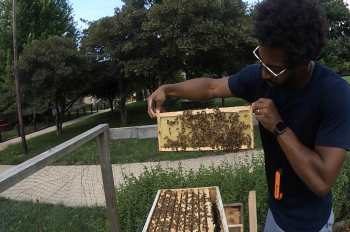Fluid Power - IIT students primed for Chainless Challenge
February 26, 2015 | Rex Robinson
CHICAGO (Chicago Sun-Times) - Some undergrad students from the Illinois Institute of Technology Armour College of Engineering are gearing up to complete this spring in the Parker Chainless Challenge, a feat that involves creating a bicycle that operates without a chain. The competition is sponsored by the California-based Parker Hannifin Corporation and students form various colleges and universities from around the country are tasked with designing the bicycle (or tricycle), building it and entering it into the competition, this year being held April 8, 9 and 10 at the Great Park in Irvine, Calif.
The goal, According to Matthew Spenko, associate professor of mechanical and aerospace engineering at IIT, is to get students more familiar with Parker Hannifin and the use of fluid power. It’s not about creating a new product, as a chain remains the best way to power a bicycle.
“This is definitely not something you would bring to market,” Spenko said. “It’s not a product development type challenge. It’s more about the learning and engineering challenge of doing something different than it is about creating a better bicycle.”
The goal is to give the students an open-ended problem to solve. There really is no one solution to the problem of using hydraulics to power a bicycle, Spenko said.
According to the specification for the challenge as outlined by Parker Hannifin, the objective is to “promote original thinking in a competitive setting by combining two technology platforms that are not normally associated with one another- the bicycle and fluid power.”
Parker Hannifin manufactures motion and control technologies and systems, providing engineered solutions for a variety of mobile, industrial and aerospace markets. The company employs approximately 57,500 people in 50 countries around the world.
There are two different phases of the competition. In the first phase, the students score points based on vehicle and fluid circuit design, hardware selection, analysis of dynamics, fluid flow, expected performance and prototype build date. The students also are tested on time management.
All this leads up to the second and final phase of the competition, which involves a sprint race, a time trial race, an efficiency challenge and other races designed to test how well each individual team’s bicycle or tricycle performs.
Two years ago, IIT walked away winning six out of seven categories. However, last year (the third year IIT students competed), a part on the bike failed and IIT was knocked out of the competition early, according to Carl Ferrario, project lead for mechanical work on this year’s team. This year, he said, he and his fellow team members are hungry for some redemption.
“We are improving on last year’s design,” said Ferrario, a former bike mechanic and junior at IIT. “We’re feeling confident that we worked out the bug.”
The bug, Ferrario added was going to a completely new design too quickly. They used a tricycle design for the first two-years and last year was the first year they used a bicycle.
While the competition is important, Ferrario pointed to the other benefits of the challenge.
“It’s that bridge between book learning and working in industry so you can hit the ground running after graduation,” he said. It’s great working with Parker Hannifin because they are such a big name in the industry.
The students also get a chance to use the latest technology. For example, according to Ferrario, the bicycle he and other students are creating this year being designed using 3D imaging software.
The students are almost finished with the prototype and are eager to move on to the final phase of the competition. Other IIT team members who are the part of this year’s Parker Chainless Challenge include Emanouel Milanov, Chaemoon Lee, Nicholas Taluzek, David Cermak and Nathan Ruhl.
Parker Hannifin underwrites the entire competition, paying for the parts necessary to build the bikes and transportation to the competition and also awards cash prizes to both the winning students and their school. This year, IIT will be competing against students from 10 different colleges and universities including the University of Illinois at Urbana-Champaign, the University of Cincinnati, California Polytechnic State University- San Luis Obispo, Purdue University, Western Michigan University, Murray State University, Cleveland State University of Akon, Case Western Reserve University and Ohio University.
One of the benefits to Parker Hannifin is it gives the company chance to find quality engineers. For example, two former IIT students who were members of previous challenges – Josh Buck and Sean O’Halloran- are now employed in Parker’s aerospace division.
Bob Meyer, who competed in the challenge for IIT last year, is now a computer-aided engineer in vehicle dynamics and loads for General Motors. He said the competition is a great way for students to work on real projects and get solid experience to prepare them for the real world.
“Fluid power is everywhere and it’s been around forever; it’s hugely powerful and versatile,” Meyer said. “Just about the only mark against it is its notorious lack of efficiency.” The chainless challenge brings this otherwise easy to ignore flaw to center stage. The rules are structured so you can’t just apply the industry standard and throw energy at the bike to overcome the lack of efficiency. You must design out the inefficiency.
Meyer said he is grateful to Parker Hannifin for creating and executing the challenge. “Anyone can donate to schools but it takes a special kind of company to break the norm and host something like the Chainless Challenge and I think this desire to set the trend is what makes Parker such an extraordinary company”, Meyer said.




